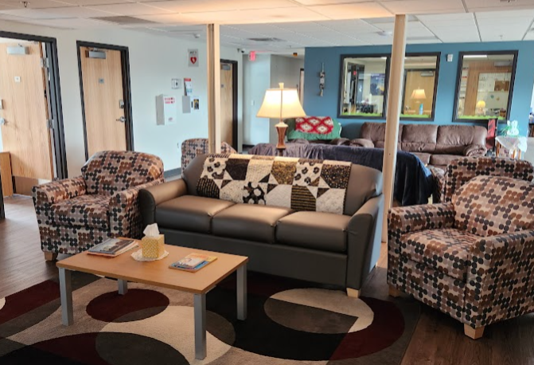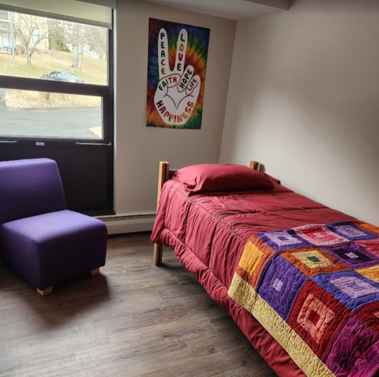Another Door: A Look Inside Youth Homelessness
Communal space at Another Door. Photo provided by Brianna Glass.
“We literally opened the doors and they went running in,” said Kelly Bergstedt-Roen, the Senior Program Manager for Another Door Youth Shelter, “it was like Christmas morning.”
That was the scene described by Bergstedt-Roen, when Another Door, an emergency youth homeless shelter in Duluth, opened its newest facility earlier in January of this year.
The expansion of the facility came based on the high demand and need for youth homeless shelters. Homelessness has been a problem in not only Duluth, but the rest of the country and around the world. With rising housing prices and cost of living, followed by no rise in minimum wage, it has made it harder and harder for people to find affordable and sustainable housing options.
The National Alliance to End Homelessness found that homelessness in the U.S. rose 18% in 2023. This brought the number from a little over 653,000 people, to over 771,000 people facing homelessness. This makes places like Another Door so important to local communities.
“When I started, it was a house across town, three bedrooms. Two bedrooms for the youth, one for our office and case management,” said Bergstedt-Roen.
At their old facility, Another Door could only house four people max at a time. Now in the new facility, as a partnership with Stepping On Up, the program can house 10 people at a time.
“Stepping On Up just kind of partnered with us and said, ‘you’re doing good work, let's find you a bigger space so that you can do more good work,’” said Bergstedt-Roen.
Another Door is a youth homeless shelter run by Lutheran Social Services of Minnesota (LSS). The whole goal of the 90-day program is to help find youth stable housing and teach independent living skills. This includes getting them in touch with resources to build up a resume, find a job, or even help people start or finish their education.
“We kind of find out where they are in education, where they are with employment, and see how that aligns with what their goals are,” said Bergstedt-Roen.
Furnished rooms at Another Door. Photo provided by Brianna Glass.
A lot of the youth who utilize the resources of Another Door are people who are aging out of the foster care system, fleeing domestic violence or abuse.
Bergstadt-Roen said that those aren’t the only situations that the youth are trying to escape,“we have had a handful of youth that are fleeing trafficking situations as well.”
Another Door focuses on taking a more “trauma informed” approach when it comes to helping their kids. As many of them are coming out of dangerous and toxic situations with adults, they are very apprehensive when it comes to receiving help from them.
“When you’re having that age group, 18-24, fleeing a trafficking situation or abusive situation, they are not very trusting of adults,” said Bergstedt-Roen.
To reach more of the youth out on the streets, Another Door also has a street outreach program, called Street Works. Every Tuesday and Thursday, Case Manager Michelle Mudek and Teen Health Center Coordinator Paige Snyder take to the streets for outreach to get the youth and other homeless populations the resources that they need.
“We approach them with care and caution,” said Mudek.
People who do street outreach go through extensive training – over 32 hours on how to approach people with kindness and awareness, without assuming, while offering services and resources to help them. They carry backpacks that include granola bars, water bottles and other hygiene kits along with palm cards with phone numbers of the different shelters and resources they offer. Also on them are harm reduction kits, these kits include things like condoms, anti-septic wipes and band aids.
“When I approached them and asked them, ‘Have you ever heard of Another Door or Lutheran Social Services?’ A lot of the time they are like, ‘No, I have no idea what you are talking about,’” said Mudek.
After doing street outreach, they offer testing for HIV at the Center for Changing Lives from 3pm to 5pm, where patients can get a $25 Visa gift card toward food and clothes. They also go stop by the Teen Closet, which is open on Thursdays from 2pm to 6pm, that allows youth homeless to stop in and get clothes, food and other necessities. Both Mudek and Snyder find that a handful of people come seeking the resources they had offered while doing outreach.
In a past experience, Mudek said, “we had a girl come in, and she was just like, ‘Yeah I came here because you said that you were gonna be open at two o’clock.’”
After a year of doing street outreach, Mudek said that she finds more people in the winter, and less people during the warmer months. She said this is because of how many people head to warming centers like CHUM and the Damiano Center in order to escape the cold.
“I felt like I came in contact with a lot more people in the winter time,” said Mudek, “as it started to warm up, I feel like more people weren’t seen as often.” She said during the warmer months, people are often more spread out in parks, forests and other parts of the city, making it harder to reach them.
In a survey conducted by the Voices of Youth Count, they found that, “one in 10 adults, ages 18-25 will experience homelessness each year.” They defined homelessness as youth who were couch surfing, staying in a shelter, sleeping on the streets, running away or being kicked out of their home.
Bergstedt-Roen said that when it comes to youth facing homelessness, “It is a lot easier to get here than people want to realize.”
Communal space at Another Door. Photo provided by Brianna Glass.
Brianna Glass, the operations manager for Another Door, said that Another Door has a 90% to 95% success rate when it comes to getting people into higher education, finding a job or getting people into stable housing. This allows people to get into income based or market rate housing, allowing people to begin building their lives up. But the hope for a future was put under threat earlier this year.
“I was in a meeting, and a grown man cried when he heard that got passed,” said Glass, in reference to the “Big Beautiful Bill.”
Back in July, the “Big Beautiful Bill” passed in the Senate and took immediate effect on July 1st. This meant detrimental effects for non-profits, such as Safe Haven and Family Rise Together, who rallied outside representative Pete Stauber’s office back in early July, that relied on government funding to keep their programs up and running. With state and county grants to back them, Another Door hasn’t seen these hard impacts, they are still feeling the effects.
“One impact we have seen is not that we have lost funding, but we can’t necessarily provide or we can’t buy the same things that we were able to buy a few years ago,” said Glass.
LSS has 16 programs in Duluth alone. This includes places like the Bethany Crisis Shelter, which is a 24/7 housing and care facility for children and youth ages 0 to 17. Along with Renaissance Transitional Housing, that is a supportive transitional housing program for youth ages 16 to 21. And for a lot of youth, Bergstedt-Roen says it's programs like Another Door that are the first step to breaking the generational trauma and poverty for youth.
“We have a sibling of an ex resident here,” said Bergstedt-Roen.
The word about Another Door has spread. From both street outreach and just by word of mouth among the people in the community. Even though people might step out the doors of Another Door, they never truly leave. The program does follow ups to check in with people and see where they are at in life.
“We just got pictures from one of them who had a baby. Mom, dad and baby are doing really well. So everybody, all the staff, got together and got them a little baby gift,” said Glass.
Places like Another Door are vital to the community for serving as a safe place to get food, sleep, and allowing the youth to begin to create a path for their future. If you or someone you know is struggling with youth homelessness, you can reach Another Door by calling 218-391-5145.



